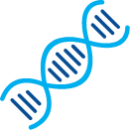Sickle cell disease
About sickle cell disease
Sickle cell disease (SCD) is a genetic disorder of the red blood cells caused by a mutation in the HBB gene. This gene encodes a protein that is a key component of hemoglobin, a protein complex whose function is to transport oxygen in the body. The result of the mutation is less efficient oxygen transport and the formation of red blood cells that have a sickle shape. These sickle shaped cells are much less flexible than healthy cells and can block blood vessels or rupture cells. SCD patients typically suffer from serious clinical consequences, which may include anemia, pain, infections, stroke, heart disease, pulmonary hypertension, kidney failure, liver disease and reduced life expectancy.
Approved drug treatments for SCD focus primarily on the management and reduction of pain episodes. While multiple experimental approaches to treat SCD are being explored in clinical trials, the majority are focused on symptomatic relief or gene therapy approaches.
We are developing pociredir (FTX-6058) as an oral therapeutic designed to induce expression of fetal hemoglobin (HbF) to compensate for the mutated adult hemoglobin in SCD, resulting in reduction or elimination of symptoms. Pociredir is currently being evaluated in a Phase 1b clinical trial for the potential treatment of SCD, which we refer to as the PIONEER study (NCT: NCT05169580). To learn more about the study, visit pioneerscdstudy.com.
Expanded access policy
We understand the urgent need of patients with few treatment options to gain access to therapies in development. Our goal, when possible, is to allow access to our investigational therapies through multiple channels when doing so does not disrupt or slow the commercialization process. Learn more about our expanded access policy.
Facts about SCD
Prevalence
- Affects approximately 100,000 individuals in the U.S. and approximately 50,000 individuals** in Europe.
- The global incidence is estimated to be approximately 300,000 births annually.***
- SCD is most prevalent in Africa and the Middle East.
- SCD is reported to shorten patient life expectancy by approximately 20 to 30 years.
Genetics

***According to the World Health Organization